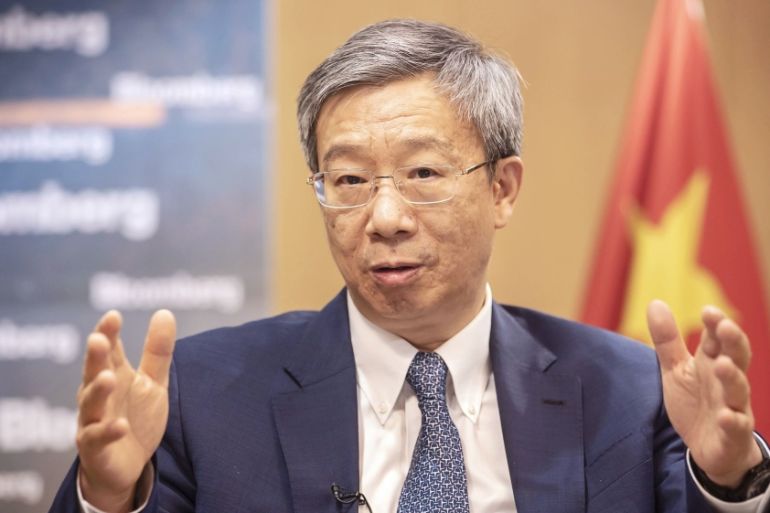China has options if trade war worsens: Central bank chief
People’s Bank of China Governor Yi Gang says interest rates and commercial bank reserves could be adjusted if needed.

China has “tremendous” room to adjust monetary policy if the trade war with the U.S. deepens, People’s Bank of China Governor Yi Gang said.
“We have plenty of room in interest rates, we have plenty of room in required reserve ratio rate, and also for the fiscal, monetary policy toolkit, I think the room for adjustment is tremendous,” said Yi in an exclusive interview in Beijing.
Keep reading
list of 4 itemsWhy are nations racing to buy weapons?
Parallel economy: How Russia is defying the West’s boycott
US House approves aid package worth billions for Ukraine, Israel
Asked if his scheduled bilateral meeting with U.S. Treasury Secretary Steven Mnuchin on the sidelines of the Group of 20 gathering of finance ministers and central bank governors in Japan over the weekend would get negotiations with the U.S. back on track, Yi said it would probably be a “productive talk, as always,” though the topic of the trade war would be “uncertain and difficult.”
That meeting takes place as the two nations escalate their trade war amid a darkening outlook for the global economy, with Citigroup Inc. and Morgan Stanley warning this week that it risks tipping the world into recession. The first publicly announced meeting since the trade talks fell apart last month could pave the way for a meeting between Presidents Donald Trump and Xi Jinping, who will likely be in Japan at the end of the month for the G-20 leaders’ summit.
Mnuchin, along with U.S. Trade Representative Robert Lighthizer, has led the U.S.-China talks while Yi has been a member of China’s delegations.
The offshore yuan weakened as much as 0.23%, the most since in a week, after Yi’s comments. The currency pared some of the loss to trade 0.16% lower at 6.9386 per dollar as of 11:53 a.m. in Hong Kong.
The yuan has stabilized in recent weeks as authorities voiced support for the currency, following a rapid sell-off that pushed it near 7 per dollar — a level not breached since the global financial crisis. It still lost about 2.5% in May, among the worst in Asia.
“Recently, it’s a little bit weaker, because the tremendous pressure from the U.S. side,” Yi said. Asked if there’s a red line for the exchange rate, Yi said no “numerical number” is more important than another.
“The trade war would have a temporary depreciation pressure on renminbi, but you see, after the noise, renminbi will continue to be very stable and relatively strong compared to emerging market currencies, even compared to convertible currencies,” Yi said, using the yuan’s official name. “I’m very confident renminbi will continue to be stable at a more or less equilibrium level.”
“A little bit of flexibility of RMB is good for the Chinese economy and for the global economy because it provides an automatic stabilizer for the economy,” he said.
Yi gave no indication that the government was considering more fiscal stimulus now to counteract the effect of the trade war.
“Our fiscal policy this year is probably the largest and strongest fiscal reform package, in terms of the tax cuts, and also in terms of having more efficient fiscal resources allocation between the central government and the local government,” Yi said. “The current package is able to cover the cases where the situation is getting a little bit worse, but of course, if the situation gets tremendously worse, they will open the discussion. But right now they haven’t discussed that scenario yet.”
The government is concerned about the effect on employment from any worsening in the dispute with the U.S., with Yi suggesting there could be support such as a 100 billion yuan ($14.5 billion) for short-term vocational training programs for those who have lost jobs.